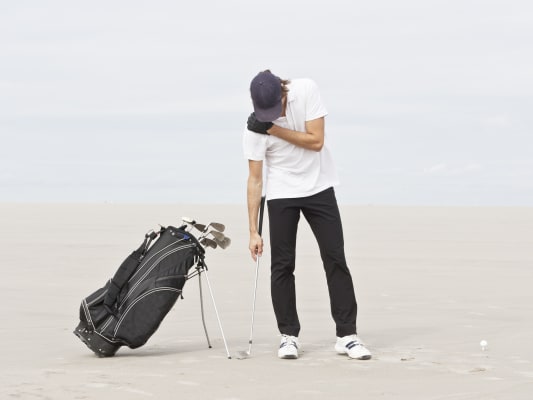Dealing With a Rotator Cuff Injury

As you select your club and start your swing, you feel it — the pain. You swing anyway. The pain, however, doesn’t go away.
Rotator cuff injuries are common in golfers because of shoulder rotation and repetitive shoulder movement. As a result, golfers should be careful and take the steps needed to prevent rotator cuff injuries, says Dr. Mark Lorenze, an orthopedic surgeon who serves as chair of Middlesex Health’s Surgery Department.
What is your rotator cuff?
Your rotator cuff keeps your arm in your shoulder socket. It is a group of four muscles, and they come together as tendons, covering the head of your humerus. Your rotator cuff attaches the humerus to the shoulder blade, helping you lift and rotate your arm.
Between your rotator cuff and the bone on the top of your shoulder, there is a lubricating sac called a bursa. This allows your rotator cuff to move easily when you move your arm. When your rotator cuff tendons are injured, this bursa can become painful.
Sometimes, your rotator cuff can even tear. If one or more of the rotator cuff tendons are torn, the tendon no longer fully attaches to the head of the humerus.
The signs and treatment
If you experience shoulder pain when reaching, shoulder pain with overhead activity, or shoulder pain at night, you may have a rotator cuff injury.
You should see a doctor if your pain limits, or affects, your daily activities. If golf aggravates your symptoms, you should stop golfing until you are seen by an orthopedist.
You are more likely to get a rotator cuff injury as you age and by repeating certain motions.
To treat your rotator cuff injury, your doctor may recommend physical therapy to improve muscle flexibility and strength, anti-inflammatory medications or cortisone injections. Surgery may be necessary if more conservative measures do not help. Surgery can offer pain relief and strength improvement.
How can you prevent a rotator cuff injury?
Dr. Lorenze says to stretch properly before you start your round of golf to help prevent rotator cuff injuries. Leave time for proper warmup to keep your rotator cuff healthy.
As an avid golfer, this is how Dr. Lorenze stays healthy and on top of his golf game, and he recommends that you do the same.
About Middlesex Health
Middlesex Health provides high quality, compassionate, personalized care in a homelike environment. Its orthopedic surgeons use the latest technology to ensure the best possible outcomes, and surgeries are performed in state-of-the-art operating rooms at Middlesex Hospital that are specifically designed to accommodate orthopedic surgeries. Some surgeries may also be performed at an outpatient surgical facility, also located in Middletown.
Middlesex Health’s diverse team of surgeons is comprised of surgeons from three private orthopedic practices. They have offices in Middlesex County and along the Connecticut shoreline.
For more information about orthopedic services at Middlesex Health, click here.
Featured Provider

Mark D. Lorenze, MD
Specialties / Areas of Care
- Orthopedic Surgery
- Joint Replacement
Locations
- Essex, CT
860-767-9053
- Madison, CT
203-245-7447
- View Full Profile
- Accepting New Patients
More Stories
Beware of the Mosquito!
It’s common to find mosquitoes on the golf course, especially in the brush, in wooded areas or near water, and they can be a nuisance — and a health risk.
Making a Difference One Golf Swing at a Time
June was a busy month for Middlesex Health. In addition to providing excellent care every day for patients, celebrating Pride Month and marking Juneteenth, the health system was at the golf course supporting the community!